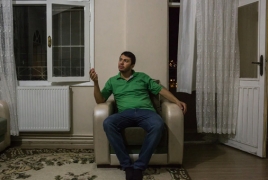
An American NASA scientist returned with his family to the United States early Tuesday morning after nearly four years of imprisonment and house arrest in Turkey, and more than seven months after U.S. President Donald Trump said he had secured an agreement for his release, The New York Times reports.
The scientist, Serkan Golge, arrived in Washington on a commercial flight shortly after midnight, ending a tortuous journey for him and his family, who had become caught up in increasingly fraught Turkish-American relations.
At a White House briefing in November with Erdogan, Trump announced that Golge would be heading home and personally thanked his Turkish counterpart for releasing Golge from detention, though he remained under judicial control for several more months.
Golge was one of up to 20 American citizens who have been imprisoned or prevented from leaving the country in a crackdown by the Turkish government after the failed coup. More than 100,000 people in total were detained, some for direct involvement in the coup but many more on the flimsiest evidence, accused of involvement with Gulen’s movement.
Golge, 40, a naturalized U.S. citizen, holds a Ph.D. in physics from Old Dominion University. He lived near Houston and had worked on preparations for NASA’s Mars mission.
He was detained in July 2016 while visiting his parents in southern Turkey and was accused of being a member of the Gulen movement — he insists he is not — which the government calls a terrorist organization.
The only evidence of that association that was produced at his trial was that he had held an account at Bank Asya, which was linked to the movement, and that a $1 bill was found in his parents’ house, supposedly a secret sign of membership.
Golge’s wife, Kubra, and his two children, all American citizens, were also barred from leaving Turkey.
The last judicial controls were only finally lifted in April, and international flights, grounded because of the coronavirus pandemic since March, only resumed this month.

